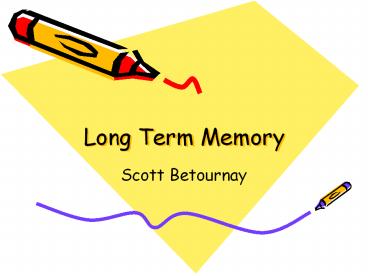Long Term Memory - PowerPoint PPT Presentation
Title:
Long Term Memory
Description:
Information can be encoded, stored, and retrieved. ... Strong evidence from primate studies (Gould et al (1999). Long Term Potentiation ... – PowerPoint PPT presentation
Number of Views:27
Avg rating:3.0/5.0
Title: Long Term Memory
1
Long Term Memory
- Scott Betournay
2
What is Long Term Memory?
- Long term memory is very large!
- It is robust.
- Information can be encoded, stored, and retrieved.
3
(No Transcript)
4
Initiation of a Long Term Memory Sensory
Reception
5
(No Transcript)
6
Pathway to Working Memory
- Epinephrine
- Norepinephrine
7
The Diencephalon is
8
Pathway to Working Memory
9
(No Transcript)
10
Pathway to Long Term Memory
11
(No Transcript)
12
Types of Long Term Memory
- Procedural memory for skills and procedure
- Declarative memory for facts!
13
Declarative Memory Is Further Broken Down
- Semantic words, concepts, information that can
be described and applied
- Episodic personal experiences and events
14
Why Mention These Types of Long Term Memory?
- Different types of memory are encoded in
different ways. - Episodic Memory is stored much easier than
semantic. - Some people have lost the function of a certain
type of Long Term Memory.
15
Amnesia
- Anterograde patient is unable to recall events
occurring after the onset of brain damage - Retrograde memories are lost from before the
onset of amnesia - Patient H. M. severed hippocampus and amygdala
caused anterograde amnesia
16
Redefining the Procedural Memory Pathway
- The hippocampus is not needed to process
Procedural Memories.
- Long-term procedural memories are stored in the
basal ganglia, cerebellum and motor cortices
17
Cellular Mechanisms of Long Term Memory
- Strengthen existing synapses.
- Create new synapses.
- Grow new neurons
- Strong evidence from primate studies (Gould et al
(1999).
18
Long Term PotentiationA Molecular Mechanism for
Memory
- Changes in the structure of neurons due to
increased use. - Cuses both the pre and post-synaptic neuron to
become more efficient.
19
Long Term Potentiation
20
References
- Barsalou L. Cognitive Psychology. Lawrence
Erlbaum Associates, NJ. 1992 - Beatty J. The Human Brain. Sage Publications,
Inc. 2001 - http//www.humboldt.edu/morgan/skil_s01.htm
- http//www.ipd.hk-r.se/bai/iea329/CognitivTheory/s
ld002.htm - http//psych.fullerton.edu/swillis/ltp.html
- http//undergrad.ahs.uwaterloo.ca/kin356/ltm/ltm.h
tm - Jensen E. Brain Based Learning. The Brain Store.
San Diego CA. 2000 - Kandel E et al. Essentials of Neural Science and
Behavior. Appleton Lange, CT. 1995
21
References
- Marieb E. N. Human Anatomy and Physiology.
Benjamin Cummings. 2001 - Tulving E, Craik F ed. The Oxford Handbook of
Memory. Markowitsch H. Neuroanatomy of Memory
Oxford University Press 2000 - Sharp P. Brain Mechanisms of Perception and
Memory. The Role of the Hippocampus in Learning
and Memory Oxford University Press, New York.
1993 - Wolfe P. Brain Matters. Association for
Supervision and Curriculum Development.
Alexandria, VA. 2001
22
How do we encode information into Long Term
Memory?
- The more we process information, the better it is
remembered. - The longer we are exposed to information, the
better we remember it. - The more we rehearse a piece of information, the
higher its probability of being remembered
23
Rehearsal
- Elaborative rehearsal processing and mental
energy devoted to rehearsing information. - Maintenance rehearsal devoting just enough
mental resource to keep information from being
lost
24
Elaboration
- The way in which we process stimuli influences
our ability to encode. - Intention, in and of itself does not help us
learn. - Depth of processing, or thinking about what we
learn, improves our ability to encode information.
25
Generation of Information
- We remember best the information that we generate
ourselves. (could give example here)
26
Imagery
- If we can visualize and picture a concept, then
we are likely to remember it better. (This is
why abstract concepts are difficult to remember)
27
Organization
- Memory for information improves when we have
knowledge to organize it - Hierarchical organization is particularly useful
for remembering large amounts of information.
28
How is Memory Studied?
- Human patients with brain structural
abnormalities - Disease
- Injuries
- Animal models to study causation
- MRI, CAT, PET scans































